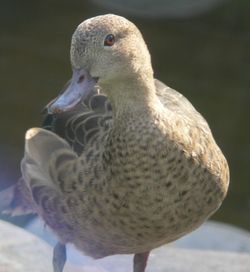Bernier's teal
| Bernier's teal | |
|---|---|
 |
|
| Scientific classification | |
| Kingdom: | Animalia |
| Phylum: | Chordata |
| Class: | Aves |
| Order: | Anseriformes |
| Family: | Anatidae |
| Subfamily: | Anatinae |
| Genus: | Anas |
| Species: | A. bernieri |
| Binomial name | |
|
Anas bernieri (Hartlaub, 1860) |
|
 |
|
| Distribution of the Bernier's teal | |
Bernier's teal (Anas bernieri), also known as Madagascar teal, is a species of duck in the genus Anas. It is endemic to Madagascar, where it is found only along the west coast. Part of the "grey teal" complex found throughout Australasia, it is most closely related to the Andaman teal.
First described by Gustav Hartlaub in 1860, Bernier's teal is one of many dabbling ducks in the genus Anas. It is one of the "grey teals", a group of related ducks found across Australasia. DNA studies suggest that it may have been a sister species with Sauzier's teal (which was found on the nearby islands of Mauritius and Réunion until it became extinct). Studies further suggest that its closest living relative is the Andaman teal, and confirm that it is related to the gray teal. There are no subspecies.
The duck's common and species names both commemorate Chevalier Bernier, a French naval surgeon and naturalist who collected nearly 200 specimens of various species while stationed in Madagascar. The genus name Anas is a Latin word meaning "duck".
This is a small duck, measuring 40 to 45 cm (16 to 18 in) in length, and ranging from 320 to 405 grams (11.3 to 14.3 oz) in mass; males average slightly heavier than females. Adult and immature birds of both sexes look the same, though males are slightly larger than females. The plumage is predominantly warm brown. The bill is reddish, and the legs and feet are a dull reddish-orange.
...
Wikipedia

